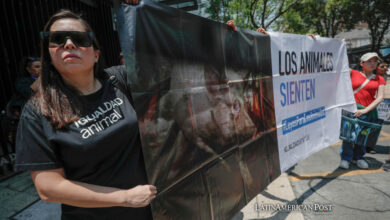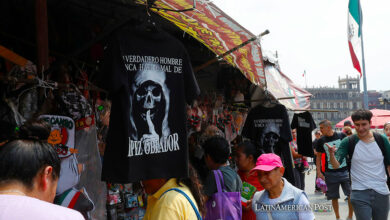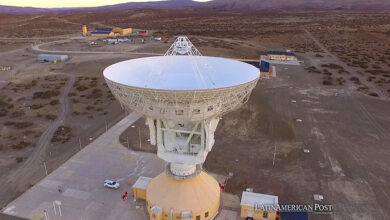In a stunning revelation, the U.S. Justice Department charges former Ambassador Victor Manuel Rocha with espionage for Cuba, uncovering one of the most extended espionage operations against the U.S. government.

Photo: File photo dated May 8, 2013 showing former U.S. diplomat Manuel Rocha as he speaks during a press conference in Santo Domingo, Dominican Republic. EFE/Orlando Barria /ARCHIVE
The Latin American Post Staff
Escucha este artículo
Leer en español: Exembajador de EE. UU. en Bolivia acusado de espiar para Cuba durante décadas
Espionage Unveiled: Former U.S. Ambassador Accused of Spying for Cuba
The United States has unveiled a startling espionage case involving Victor Manuel Rocha, a former ambassador to Bolivia, who has been charged with spying for Cuba for over four decades. This case, as described by the Justice Department, represents one of the most significant and enduring breaches of U.S. national security by a foreign agent.
Rocha, who held the prestigious position of U.S. ambassador to Bolivia from 2000 to 2002, faces multiple federal charges. These include acting as an unregistered foreign agent and using a fraudulently obtained passport, per the Justice Department's announcement. This case throws a spotlight on the intricate and long-lasting web of espionage that Rocha allegedly wove within the highest echelons of the U.S. government.
Decades-Long Allegiance to Cuba
"We allege that for over 40 years, Victor Manuel Rocha served as an agent of the Cuban government and sought out and obtained positions within the United States government that would provide him with access to non-public information and the ability to affect U.S. foreign policy," Attorney General Merrick Garland said in a statement.
Rocha, now 73 years old, was arrested and is scheduled to appear in federal court in Miami. His arrest ended a career that spanned over two decades in the U.S. State Department, from 1981 to 2002. His roles were not limited to diplomacy; he also held significant positions within the U.S. national security apparatus. This included a stint on the White House's National Security Council from 1994 to 1995 and as an advisor to the Commander of the U.S. Southern Command, a critical role he played from approximately 2006 to 2012.
Covert Support and Questions on U.S. Security Protocols
The charges filed in the Southern District of Florida allege that Rocha covertly supported Cuba and its clandestine intelligence-gathering activities against Washington since 1981. This long-spanning espionage operation raises serious questions about the vulnerabilities in U.S. government security protocols and the effectiveness of background checks and ongoing security assessments for high-level officials.
Interestingly, Rocha's espionage activities were revealed following his admission of decades-long work for Cuba during a series of meetings in 2022 and 2023. In these meetings, he unknowingly spoke to an undercover FBI agent, who posed as a representative of Cuba's General Directorate of Intelligence. These interactions led to the unmasking of Rocha's covert activities.
This case is particularly significant, not only because of the high-level access Rocha had but also due to the duration of his espionage activities. It underscores the persistent efforts of foreign governments to infiltrate the U.S. political system and access sensitive information. The case also highlights the ongoing challenges U.S. intelligence and law enforcement agencies face in detecting and thwarting such long-term covert operations.
Foreign Interference Concerns and the Complex World of Espionage
The revelation of Rocha's alleged espionage activities comes at a time when concerns about foreign interference in U.S. governmental affairs are at a peak. It sheds light on the complex and often hidden world of international espionage, where individuals in positions of trust may lead double lives, jeopardizing national security for decades.
Also read: U.S. Democrats Propose Bill to Curb Arms Trafficking to Mexico
The charging of Victor Manuel Rocha serves as a stark reminder of the continuous threats to national security from foreign espionage. It also prompts a reevaluation of the processes used to vet and monitor individuals in sensitive government positions. As Rocha awaits his day in court, the U.S. government must grapple with the implications of this breach and take steps to fortify its defenses against such insidious threats. This case is not just about one individual's betrayal; it's a wake-up call about international espionage's persistent and ever-evolving nature.




